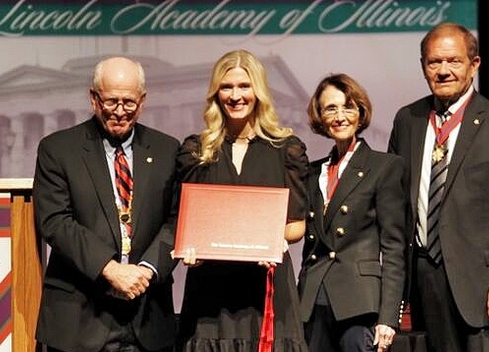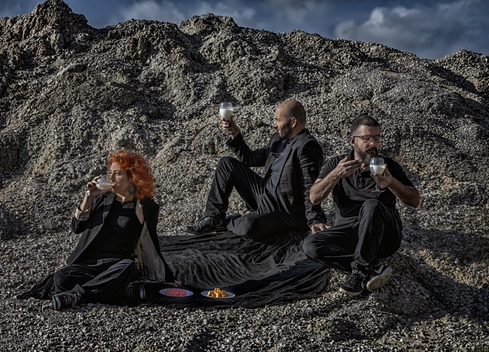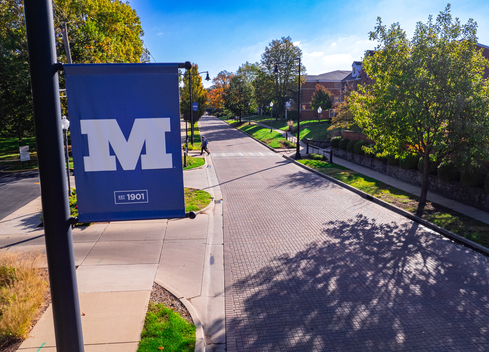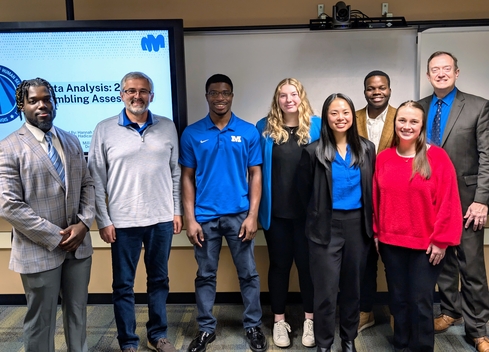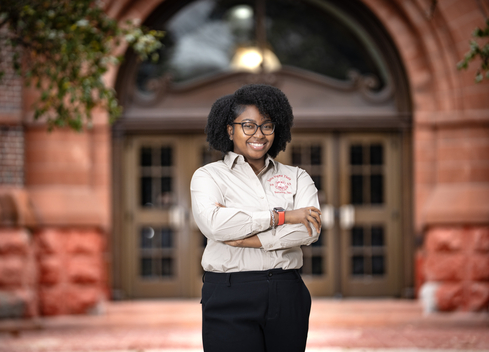Departmental Course Offerings
Courses change each semester, so this list should not be considered a commitment to these individual topics. However, this list of many of our current and popular courses is provided so you can begin to imagine your academic career at Millikin in this major.
EN120. Approaches to Literature (3)
An introduction to literature and to basic methods of literary analysis and interpretation. Includes reading of short fiction, novels, poetry, and drama. Recommended as a course that fulfills the College of Arts & Sciences literature course requirement.
EN160. Reading Roundtable (1)
The Reading Roundtable offers students the opportunity to read significant works of literature, and to learn techniques of participating in--and leading--discussions about literature. Topics vary from semester to semester.
EN170. Creative Writing Roundtable (1)
The writing roundtable is a studio-style, performance-based reader response workshop. Students share and respond to ongoing writing projects which culminate in formal presentation and/or publication. Topics include poetry, playwriting, screenwriting, folklore, haiku, fiction, or writing for children.
EN175. English Language Arts Education Roundtable (1)
English Language Arts Education Roundtable offers students the opportunity to become involved in professional organizations in English language arts education. The course may focus on a professional conference (which students will attend) or on a professional organization (which students will join). Students will become familiar with the goals and activities of these organizations.
EN180. Introduction to Tutoring Roundtable (1)
Provides students with theoretical and experiential grounding in peer tutoring of writing, allowing them to move from the traditional role of instructed subjects to a more dynamic role as peer tutors and collaborators; examines the philosophy of the Writing Center and how that fits into the theoretical/pedagogical approaches to peer tutoring, and moves into practice, focusing on interpersonal dynamics, audience adaptation, and collaborative learning; students will engage in active sharing and development of tutoring styles, skills, and strategies; investigate writing in the disciplines; and engage in self-reflection in the practice of peer tutoring; course combines discussion, lecture, reflection, group work, and tutor presentations that will allow students opportunities to share, analyze, and critique as well as connect theory and pedagogy to real world tutoring experiences.
EN200. Writing Seminar (3)
A seminar course on the composition of non-fiction prose, emphasizing clarity of style, audience, and development of ideas. Content will vary semester to semester. Representative topics include persuasion and argument, expressive writing, resistance writing, letter writing, extended essays, and multimodal compositions.
EN201. Introduction to Creative Writing (3)
A workshop-based Performance Learning writing course introducing students to three of four genres: fiction, poetry, nonfiction, and drama. Special attention to techniques of voice, image, character, story, setting, narration, description, and prosody. Workshop culminates in a portfolio with an introduction/reflection and a performative reading of one piece of writing.
EN202. Writing About Literature (3)
An early exploration of what it means to study and write about literature as a professional, with a particular focus on literary criticism and theory. The class begins with the question of why we read and write about literature, moving on to careful readings and close textual analyses of literary creations—from the traditional to the experimental—focusing on explication, analysis, and interpretation. In the process, the course introduces basic critical approaches to studying literature, including reader-response theory; New Criticism; feminism and gender theory; lesbian, gay, and queer theory; psychoanalytical theory; Marxist theory; African American theory; and postcolonialism. As a final project, students take on the close study of a novel-length work, producing both their own near-professional critical analyses, as well as supplementary materials to be included in a digital Casebook on the text.
EN210. Professional and Technical Writing (3)
In this course, students practice writing some of the most common technical genres and learn how to determine which genre to use in a given situation. Additionally, students learn the rhetorical strategies necessary for document design and learn how ethics, histories, cultures, and technologies shape work within the field.
EN212. Environmental Writing (3)
This course is a study of the diversity of perspectives on “nature” and “environment” as they are taken up in scientific research, public policy, social justice movements, mass media coverage, and literature. Students will become more critical readers and writers of the environments that surround them and the cultural, social, scientific, historical, and government dimensions of environmental issues and debates. Students will analyze existing writing focused on issues such as global warming, food production, water and air pollution, environmental justice, and more and will also develop an in-depth research and writing project on an environmental topic of interest to them.
EN215. Journalism: Newswriting I (3)
Introduction to basic methods of news reporting and writing. Students learn Associated Press style basics and an introduction to journalism ethics while writing the basic types of news stories: obituaries, advances, follow-ups, breaking news, controversy, and research-based. Focuses on print journalism, but also addresses broadcast news writing.
EN220. Literary Topics (3)
Readings in literature that focus on a particular topic. Offerings vary semester to semester, with recent topics including gender roles in literature, ethnic voices in America, horror in film and literature, digital literature, and science fiction. Recommended as a course that fulfills the College of Arts & Sciences literature course requirement.
EN222. Contemporary Adolescent Literature (3)
Adolescent or Young Adult (YA) Literature (and media) is written and intended for adolescents and framed within a rich literary, historical, and social context. In this class, we will explore this highly popular, often trivialized, canon and examine the impact these texts have on our education, culture, and ideologies. Together we will broaden our understanding of the richness of this genre and its place in the literary canon. Through multiple modes, students will better understand the topics, styles, themes, and issues common to YA literature and media, as well as the different subgenres available to young adult readers and viewers. We will examine the purpose of writing for adolescents will considering why so many of these texts are challenged and/or labeled controversial. Recommended for all Education majors, especially language arts students.
EN231. American Literature through Twain (3)
This course is a study of major American writers, ideas, and literary trends from early native and Puritan literature through the works of Mark Twain. The course examines cultural, intellectual, and historical contexts for the readings. Themes and units covered include Native Voices, Contact and Conflict in North America, the Utopian Promise, the Spirit of Nationalism, American Romanticism (Transcendentalism and Gothic), and Race and Identity in Antebellum and late nineteenth-century America.
EN232. American Literature from 1900 to the Present (3)
A survey of modern and contemporary American writers, examining their work within the cultural, intellectual, and historical contexts of the 20th and 21st centuries. The course covers works from across genres, including poetry, prose, and drama, and explores such topics as Naturalism, Regional and Social Realism, the Harlem Renaissance, Modernism, Postmodernism, and contemporary American writing. Along with close readings of the literature itself, the course also examines a broad range of cultural influences that have shaped American literature, including the fine arts, history, religion, politics, and popular culture.
EN233. African American Literature (3)
From Phillis Wheatley to Edward P. Jones, from spirituals to folk tales, from slave narratives to postmodern novels, students study major African American authors, literary forms, and themes in their social, historical, and cultural contexts. Topics and authors may vary from semester to semester. Recommended as a course that fulfills the College of Arts & Sciences literature course requirement.
EN234. American Multicultural Literature (3)
An introduction to American writers from diverse cultural backgrounds. The course will examine culturally specific questions, as well as cross-cultural issues of race, class, gender, and sexuality. Topics and authors may vary from semester to semester. Course may include authors such as Toni Morrison, Zora Neale Hurston, Sandra Cisneros, Julia Alvarez, Sherman Alexie, Audre Lorde, Richard Rodriguez, Philip Roth, Maxine Hong Kingston, and N. Scott Momaday. Recommended as a course that fulfills the College of Arts & Sciences literature course requirement; may fulfill U.S. Cultural Studies requirement
EN241. Western Classical Traditions: Literature, Rhetoric & Culture (3)
Using a decolonizing approach, this course examines the role of poetic and rhetoric in ancient societies, both oral and literate. Focusing on the tension between oral traditions and the emergence of a radical new technology (techne) called” writing,” the course engages students in close readings of ancient primary texts such as Homeric hymns and epics, ancient dramas & myths, Sappho’s love poems, Aristotle’s Rhetoric and Poetics, & Plato’s Phaedrus.
EN250. Introduction to Film (3)
An introduction to viewing film as an aesthetic art form, with some emphasis on cinema terminology and technique, the history of film, and the relationship between film and literature. Focus is often specifically on U.S. films, from the classic to the contemporary. These films often include examinations of issues of race, class, or gender in an American cultural context. Recommended to fulfill the College of Arts & Sciences literature course requirement.
EN270. Computer-Aided Publishing (3)
An introduction to computer-aided publishing for print-media production. A workshop of simple to more complex publication projects that develop three essential skill sets: (1) basic principles for good design, (2) industry-standard publishing technology, and (3) editing for and managing the publishing process.
EN280. Journalism Laboratory (1)
Staff members of the Decaturian, Millikin’s student newspaper, receive credit for making a regular contribution to the paper for the semester, writing, and performing other weekly duties for each issue. Participants create a portfolio reflecting on their development during the semester. This course can be repeated each semester for up to eight credits.
EN290. Sophomore Writing Portfolio (1)
Sophomore Writing Portfolio is a one-credit workshop required of all sophomore-level writing majors (including transfers). The primary goal of the course is to provide an opportunity for sophomores to review and reflect on their writing, editing, and publishing projects completed in their first two years of study. Over the course of the semester, students work to discover their writing identities in relation to various audiences and to develop a strong sense of the expectations of the writing major and the various writing concentrations. Students develop a preliminary personal writing theory. By the end of the course, each student designs, prepares, and presents a professional writing portfolio that demonstrates the knowledge they have acquired about what constitutes quality performance at Millikin and in the broader field.
EN300. Advanced Writing (3)
Specialized topics in writing at the advanced level, including such representative areas as persuasion, resistance, public relations, technical writing, grant writing, and science writing. Includes an extended writing project.
EN301. Advanced Creative Writing (3)
Advanced workshops in creative writing, such as the short story, memoir, translation, playwriting, verse, poetry, drama, nonfiction or a special theme. Topic varies by semester.
EN302. Methods for Teaching Literacy in the Content Area Classroom (3)
This course is required for all K-12 and secondary content area majors. It supports the Illinois Professional Teaching Standards (IPTS), Illinois Learning Standards (ILS), and Common Core State Standards (CCSS) in literacy for English/Language Arts, History/Social Science, Science, Math, Art, P.E. and Music. Course content focuses on the preparation of teacher candidates for the responsibility of content and disciplinary reading, writing, listening, and speaking instruction within their classroom. Together, we examine the pedagogical implications of literacy as a cognitive, socio-cultural, and historical practice with emphasis on culturally relevant pedagogy, language acquisition and development, instructional design and assessment, and differentiation for students with diverse needs. Requires Admission to the School of Education.
EN305. Web Publishing (3)
This course introduces students to foundational principles of writing, editing, designing, and publishing on the web and to the computer tools that can assist students with this type of work. Students will develop a rhetorical awareness of design concepts and apply principles of design thinking through a combination of analytical and production-based assignments such as: conducting rhetorical analyses of specific websites; creating personal websites; writing and editing web content for a variety of purposes; and collaborating on a web design project for a local client.
EN306. Freelance Writing (3)
This course examines the fundamentals and business of freelance article writing for print and online publications, including consumer magazines, trade magazines, custom publications, websites, and blogs. Students will learn about the publishing industry and how it operates; research and study a variety of print and online publications as potential markets; develop story ideas and pitch them to an appropriate market; and write department, feature, and online articles.
EN307. Professional Editing (3)
This course focuses on the theories and practices that guide professional editors who are integral in a variety of capacities to the production of written texts. Students will learn about the different roles of editors in the publishing industry and will practice all levels of editing: developmental editing, content editing, technical editing, copyediting, proofreading, and fact checking. The course enables students to interact with current professional editors and also gain hands-on editorial experience through a Performance Learning client project.
EN308. Beyond the Page (3)
This course considers the potential and constraints of storytelling in multiple modes. Students will read, analyze, and craft narratives that employ various non-linear forms and use numerous technologies and media. Genres studied and created may include podcasts, documentaries, online articles, and social media posts. Students also will consider how stories (digital, material, and otherwise) shape communities, identities, memories, and perspectives, and they will study the effects of composing with a hybrid of aural, visual, and written forms for a variety of audiences.
EN309. Critical Storytelling (3)
Critical Storytelling can empower researchers, readers, and the storyteller to question, think, act, and question yet again. Well-developed critical stories raise questions that provoke readers to dig deep and think again, from a different perspective. In this class, students move from identifying personal issues that speak to social global problems, to drafting their own critical stories, revising them as a group, and advancing them toward publication in an edited book. Students partner with an international publisher and engage in steps of the process of publishing a book with scholarly press.
EN310. Applying Writing Theory (3)
This course introduces students to contemporary theories of writing (broadly conceived), including theories from rhetoric, composition, and professional writing studies. Students will explore these theories and how they can apply them to their own writing processes and when analyzing existing texts. Additionally, this course examines the history and application of writing theory to the teaching and practice of writing in a wide range of contexts.
EN312. Media Ethics (3)
This class introduces students to the complexity of media ethics. A common approach to media ethics examines the problems and dilemmas faced by news media, this class expands by looking at ethics in many forms of media. The class looks at issues presented in social media, in film, communications as well as the press. The class presents the philosophical foundation necessary to make informed decisions about issues surrounding media.
EN315. Newswriting II: Beat Reporting (3)
Expands on principles covered in EN215 Newswriting I. Students identify a specific beat (i.e. covering a particular sport, news beat, organization’s activities) and develop expertise and source building by covering the same beat for the semester.
EN316. Feature Writing (3)
An advanced journalism course focusing on feature writing. Students analyze award-winning feature stories and research and write their own in-depth newspaper/magazine style features. The course also covers editorials and reviews.
EN317. The Art of Opinion (3)
This class examines the art of persuasion through the lens of opinion and considers how opinion has been used to shape public discourse about specific topics. Students will study examples of opinion writing from some of the best columnists in the United States who have published on platforms ranging from pamphlets and newspapers to online blogs. Students also will write extensively, perfecting different styles and approaches to opinion, and will learn how to make their arguments persuasive, entertaining, and on-point. Types of opinion covered include columns, editorials, and analysis essays.
EN318. Sports Writing (3)
This course covers advanced techniques and approaches for writing about sports. Students will learn the process involved in and strategies for effective sports writing, including techniques for covering sporting events, speaking with athletes and coaches, and writing sports articles. Students will cover local athletic events and write blog posts, news articles, and feature articles.
EN319. Investigative Reporting (3)
This class examines the approach and process of writing in-depth investigative reporting pieces. It uses examples from the world of journalism to give students perspective and help them learn the genre of the investigative newspaper article. Students will propose, research, and write a full investigative piece that includes background research and in-depth interviewing.
EN321. Major English Authors I (3)
Reading and analysis of major writers of English literature from the beginnings to the end of the 18th century. In a typical semester, students will read such works as Beowulf, Old English elegies, Sir Gawain and the Green Knight, and authors such as Chaucer, Sidney, Shakespeare, Marlowe, Donne, Marvell, Dryden, Swift, Pope, Johnson. Students will also trace the evolution of the English language and the major cultural movements, political events, and literary conventions of each period.
EN322. Major English Authors II (3)
Reading and analysis of major writers of English literature from the latter part of the 18th century to the present. We will engage with authors from the Romantic, Victorian, and Modern periods, as well as contemporary authors from the former British empire.
EN325. Studies in Shakespeare (3)
Specialized topics in Shakespeare studies from both literary and theatrical perspectives. Topics and readings vary from semester to semester and include an historical and/or theoretical perspective on the Early Modern period, Shakespeare’s life, drama, and poetry. Fulfills Shakespeare requirement for literature, writing, and English Education majors; Arts & Sciences literature requirement; and dramatic literature requirement for Theatre.
EN331. International Film (3)
This course explores world cinema through genre, contrasting international films to popular American ones. Major genre comparisons include "the warrior hero," “the wedding film," "the horror film," and "the road movie," with special focus on the films of China, India, Japan, and Latin America. Overall, the course is an introduction to the global traditions of film, emphasizing the universal nature of cinema while at the same time examining regional-based cultural differences. It includes an examination of the language of film analysis along with a survey of developments in world-wide cinema. Films are analyzed not just culturally, but through universal lenses that include post-colonialism, feminism, and Marxism.
EN335. International Literature (3)
International Literature emphasizes an in-depth comparative study of texts, themes, genres, and authors from around the world, including those of the global diaspora. Recommended as a course that fulfills the College of Arts & Sciences literature course requirement; may also fulfill the International Cultures and Structures requirement.
EN340. Studies in Poetry (3)
Specialized topics in poetry at the advanced level. Content varies from semester to semester, and may include a single major writer, period, form, or theme. Representative examples include modern American poetry, global haiku, British Romantic poetry, and love poetry.
EN350. Studies in Drama (3)
Specialized topics in drama at the advanced level. Content varies from semester to semester. Representative examples include modern American drama, theatre of protest and resistance, Elizabethan and Jacobean tragedy, and modern global drama.
EN360. Studies in Fiction (3)
Specialized topics in short fiction and novels at an advanced level. Content varies from semester to semester, and may include a single major writer, period, form, or theme. Representative examples include major women writers, the modern American novel, the gothic tradition, global postcolonial fiction, neo-slave narratives, and digital literature.
EN366. Studies in Literary History (3)
Advanced study of literature in historical, intellectual, and cultural contexts. Content varies from semester to semester, and may include works from across a variety of genres. Representative examples include medieval literature, postcolonial literature, comparative fairy tales, and the literature of exile.
EN375. The English Language (3)
In this course students will examine the conventions of English language as they relate to various rhetorical situations (grammar, usage, and mechanics); understand the concept of dialect and become familiar with relevant grammar systems (e.g., descriptive and prescriptive); understand principles of language acquisition; recognize the influence of English language history on ELA content; and understand the impact of language on society.
EN380. Studies in Journalism (3)
Specialized topics in journalism at the advanced level. Content varies from semester to semester. Representative topics include investigative reporting, advanced feature writing, review/editorial writing, history of journalism, editing, and newspaper publication design
EN382. Advanced Writing and Publishing Projects (1-3)
Highly qualified students collaborate with faculty on scholarly, writing, or publishing projects. Topics vary including advanced web publishing, advanced web graphics, literary editing, the history of book production, and arts of publishing.
EN 384. Art of Publishing (1-3)
Art of Publishing is a Performance Learning practicum in book publishing. Students learn by working as an editor or designer carrying out specific responsibilities for a student-run book publishing company. Possible student positions include editor, production manager, art director, designer, and marketing manager. For questions, contact Dr. Stephen Frech.
EN 386. Letterpress Publishing: Blue Satellite Press (1-3)
Blue Satellite Press prints poetry broadsides (more commonly known as posters) in letterpress formats. We will learn aspects of design and print production that letterpress printing encourages: layering, color “interaction,” and font as a design element; one can learn these elements in computer layout, but only with deliberate, conscious effort. We will be doing the editorial work of an ongoing press: selection of work to print, communications with poets, and distributing the printed broadsides.
EN 388. Publishing Roundtable (1)
The Publishing Roundtable broaches relevant subjects in the field of publishing and editing. Offered on a rotating basis, roundtable topics include magazine journalism, authorship, scholarly publishing, and fine art.
EN410. Senior Writing Portfolio (3)
Senior writing and literature majors and other highly qualified students develop a professional writing portfolio. Also includes preparation for careers and professions in writing.
EN420. Seminar in Literature (3)
Advanced seminar and capstone course for Literature majors in which students complete a major project in literary study. Often taught in association with another advanced course, content varies semester to semester. Representative examples include global postcolonial literature, digital literature, modern American drama, otherworldly Shakespeare, neo-slave narratives, and British Romantic poetry.
EN425. Methods of Teaching and Assessment in Literacy and Language Arts for Grades 5-12 (3)
In this course, English Education majors develop advanced methods and materials for teaching English/Language Arts with a focus on listening, speaking, reading writing, and language development across the curriculum. This course is designed to help students combine theory, research, and practice into sound strategies for teaching English in grades 5-12. In conjunction with national and state guidelines, students will begin to develop a philosophy of secondary ELA teaching with an emphasis on culturally and linguistically rich, equitable, and accessible curriculum and instruction. Topics of study will center on the development of a teaching portfolio, including philosophy statements, planning and organizing a multi-part unit of instruction, language and literacy assessment, and professional development around critical issues within the profession. A foundation for the edTPA will be developed within this course.
EN470. Internship in the Teaching of Writing (3)
In this course, students work with a faculty member as a teaching intern for a first-year writing course (usually EN181: University Writing). As a teaching intern, students collaborate with the faculty instructor to design assessments, facilitate writing instruction, and work one-on-one with student writers. Teaching interns also read about and discuss various composition theories in relationship to writing pedagogies. This course is required for English Education majors and encouraged for all English majors planning to attend graduate school.
EN480. Professional Writing Internship (1-3)
The internship provides qualified students an opportunity to receive academic credit for supervised, non-classroom experience in an employment setting. Students may choose to serve apprenticeships in various fields of interest, such as scholarly journal publishing, magazine editing, newspaper journalism, book publishing, or other areas of professional training. A maximum of six credits of internship may count toward major, with no more than three credits per semester.
EN491. Independent Study in English (3)
Opportunity for the advanced student to pursue a special topic or project independently, under the guidance of an English faculty member. A learning contract indicating tasks to be completed, learning goals, and timeline for review of work is required.

